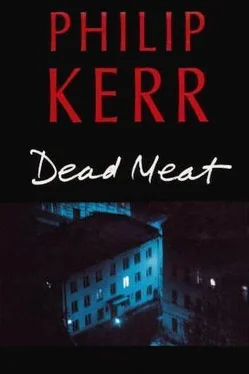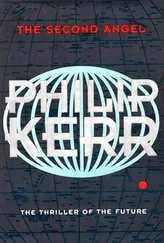‘One night I was at home and I got a call from this militiaman at the Moskow,’ he explained. We went down the steps and along the pavement. ‘The Swiss police had got themselves into a bit of bother. Some girls had joined them for dinner and they’d helped them spend quite a bit of money — well, by our standards. There were empty bottles of champagne all over the table. Anyway, at the end of the evening the girls, who were hard-currency prostitutes you understand, put it to the Swiss that they should all go upstairs. Only the Swiss thought better of it. But the girls felt that they had wasted a whole evening on them without result: I mean, what’s a free dinner next to a hundred dollars, right? So they told the Swiss that they were working girls who needed the money and expected to be paid for their company. There’s nothing more rapacious than a Russian whore. But the Swiss disagreed and so the girls called their pimp in to try and settle the dispute. One of the Swiss persuaded a militiaman to give me a call and I had to go and sort it out. I had the militiamen throw the girls in the hotel cage and threatened to pinch the pimp.’ He pocketed the lighter. ‘So now you know how I came to own this cigarette lighter.’ His tone was defensive.
I shrugged. ‘I’m sure it’s none of my business.’
‘Just as you like,’ said Grushko.
We found Grushko’s car and drove north, across the Neva. Where the reddening sun touched the shiny graphite surface of the river it looked as if someone had washed a murderous, bloody axe in the water.
Ochtinsky Prospekt, in the east of St Petersburg, was exactly like the place where I had lived in east Moscow. Exactly like any big housing estate in Russia, now that I come to think of it. Once, when I was returning from a holiday in the Crimea, I saw my home from the air. It was as if a giant had gone to buy some shoes and tried on every pair in the shop. (This could not have been a Russian shop.) In her concern to make a sale (this could certainly never have been a Russian shop), the assistant had thrown the white boxes all over the place until the floor was littered with them. That was what my home looked like from the air. Something that had been dropped there, randomly, without any thought. Quite unreal.
Inside one of the boxes, each of them twelve storeys high and housing as many as five hundred families, life was only too concrete, however. At Number seven Sredne-Ochtinsky, where Porfiry Zakharych Lebezyatnikov lived with his wife and child, human habitation was all too substantive. It was not that the walls were too thin to keep out the noise made by the family living next door to my brother-in-law; nor was it that the rooms squeezed between the walls were too small. No more was it that the tiny, creaking lift smelt like a urinal; nor the lack of light-bulbs that made the passageways dangerous at night. It was not the very homogeneity of the landscape that could be viewed from the window-box which Porfiry laughingly called a balcony. But rather it was all these things that, when taken together, contrived to make the inhabitant feel like a rat in a very large and dirty nest.
I was used to feeling like a rat in my particular line of work.
As one of ‘them who can go abroad’, Porfiry Zakharych was better off than most. Frequent business trips to Stockholm, Helsinki and, once, to London on behalf of his employer, the Baltic Shipping Company, had enabled him to acquire all the luxury consumer goods and the hard currency you needed to live well.
I call him my brother-in-law, but he and my sister had divorced long ago because of her alcoholism, and this was the first time I had met his new wife, Katerina. She was a striking looking woman with a dark, slightly oriental face and the most perfectly formed breasts I had ever seen. With breasts such as these it was hard not to gain the impression that they were the main reason why Porfiry had married her. She wore a low-cut top that looked as if it had been sculpted for her, and a necklace that was made of coral.
Porfiry was less than distinguished. Older than Katerina by at least ten years, he was grey-haired and slightly overweight, with a bad, pitted skin that here and there had erupted in various moles and cysts, not the least of which was a stamp-sized purple birthmark on the side of his fleshy neck. He greeted me with a warm hug and a kiss on both cheeks.
‘So,’ he said, ‘here you are at last. Tell me, what do you think of Katya? Isn’t she gorgeous?’
‘Stop it, Porfiry,’ she giggled, colouring with embarrassment.
‘She certainly is,’ I said, without any false politeness.
‘And what about our apartment?’ he continued.
I looked around. ‘It’s very comfortable,’ I said.
Porfiry pointed to a handsome wood cabinet that contained an enormous colour television and VCR.
‘Finnish,’ he said proudly. ‘We’ve got satellite, too.’
He demonstrated the variety of channels that were available with a remote control that was the size of a small computer.
After Porfiry had shown me his computer, the microwave oven, the stereo music centre, his new camera, and demonstrated how to operate the gas water-heater system in the kitchen, he introduced his dog, Mikki, an enormous bull-terrier, while Katerina made me a bowl of semolina. After I had eaten this we all toasted one another’s health with some Georgian brandy that helped to take away the taste of the semolina.
When we had exchanged all our news, I told them about the murder of Mikhail Milyukin and they said that it had been reported on the television evening news.
‘The reporter said that the militia think that it’s the work of the Mafia,’ said Katerina.
‘It certainly looks that way,’ I allowed. ‘They had more than enough reason.’
‘And what does the great Grushko think?’ asked Porfiry.
‘You know Grushko?’
‘No, not personally. But he’s often on television talking about some crime or another.’
‘There’s a lot of crime here these days,’ said Katerina. ‘You’re afraid to go out. That’s why Porfiry got Mikki. To protect me when he’s away on business.’
‘Or hunting,’ added Porfiry. ‘We’ll go hunting soon, eh?’
‘Great,’ I said. ‘If I can get any time off. Milyukin’s murder has really made things rather busy for us.’ I finished my glass of brandy and let Porfiry help me to some more. ‘Besides, I’m supposed to find out how Grushko does things.’
Porfiry shrugged. ‘Even if you catch the ones who did it,’ he said, ‘we’ll never defeat the Mafia. You know that, don’t you?’
‘Why do you say that?’
‘Because it’s the one thing in this country that actually works.’
The next day I was due at the State Prosecutor’s Office and so Porfiry, whose journey to his offices in the passenger seaport took him in that general direction, gave me a lift in his car. This was a bright red new Zhiguli and Porfiry was as proud of it as he was of all his other toys. All the way across the city he talked about how he had driven it into the country from Helsinki, and I was quite glad to get out by the time we got to Yakubovica Street.
The State Prosecutor’s Office was a decrepit building much like the one I inhabited on Kalayeva Street, with the same green walls, the same ancient lift and the same sour-piss smell. Vladimir Voznosensky’s box of an office was on the second floor and he shared it with a broken microwave oven, several tonnes of papers and an ancient army carbine with which he claimed he went hunting, although I could not imagine that it could ever have fired. Voznosensky, a slight, fair-haired figure with a flourishing moustache and a cardigan that, despite the warm weather, he wore zipped up to the neck, greeted me cordially.
Читать дальше












